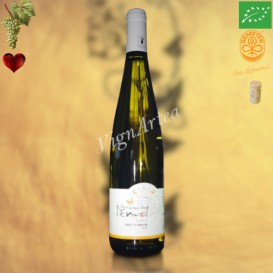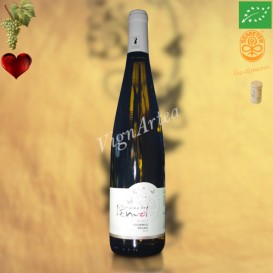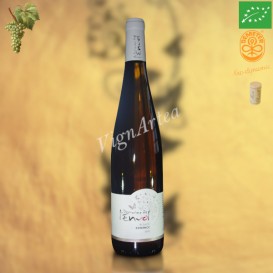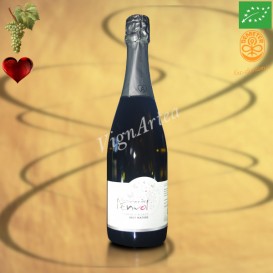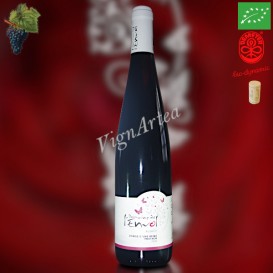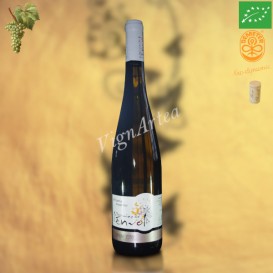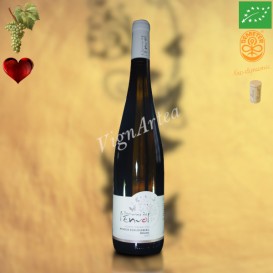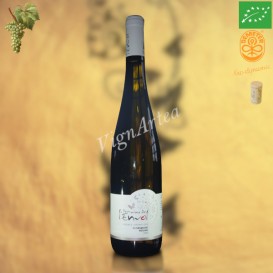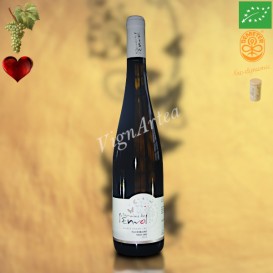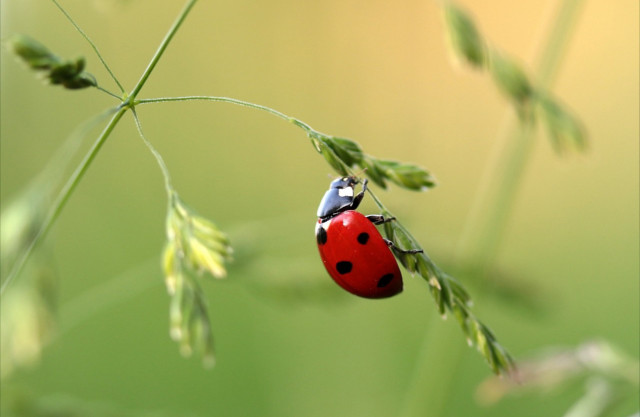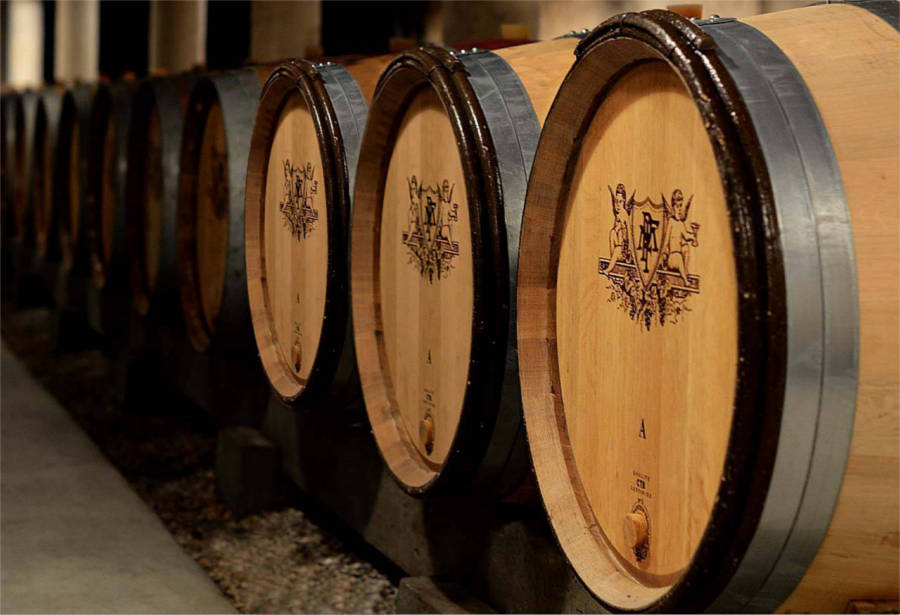Domaine de l'Envol - Alsace

ALSACE 20 ha ORGANIC & BIODYNAMIC AGRICULTURE WINEMAKERS: Hirsinger & Freudenreich families
ESTATE HISTORY
The Domaine de l'Envol, located in Ingersheim to the north of Colmar, was created in 2016 by two winegrowing families who have joined their forces: the Hirsinger family (Ingersheim) and the Jean Freudenreich family (Pfaffenheim), both of whom have been involved in winegrowing activities for many generations.
By joining forces, these two families are able to manage a vineyard totalling 20 hectares, which extends over the communes of Ingersheim, north of Colmar, and Pfaffenheim, south of Colmar, and is spread over a vast mosaic of terroirs, enabling them to offer a wide range of wines with a strong identity.
TERROIR
Alsace's vineyards cover the hillsides from the foothills of the Vosges mountains to the Rhine plain. The varied landscapes of mountains, hills and plains, shaped by the emergence of the Rhine Graben, are the legacy of a turbulent geological history dating back nearly a billion years.
From the edges to the centre of the Rhine Graben, there are three distinct topographical units:
- The Vosges mountains, between 400 and 1400 m of altitude, reveal the old magmatic rock base that formed the single Vosges-Forêt Noire block. Here you'll find vineyards on granite, gneiss, schist, volcanic formations and sandstone sediments.
- The sub-Vosgian hills, which range in altitude from 200 to 400 meters, form a narrow strip of land that has collapsed with the ditch, offering a sedimentary cover dating from the secondary era, next to which a fringe of tertiary conglomeratic deposits covers the eastern part of the hills. Most of the vineyards are located on these hills.
- The alluvial plain occupies the centre of the ditch, at an altitude between 120 and 220 meters. The shallow slope between the hills and plains conceals a major tectonic fault: the Rhine fault, covered by the piedmont glacis. Above the collapsed secondary terrain, the marly Tertiary fill of the ditch (2 to 2.5 km thick) is in turn covered by the Quaternary alluvium of the Vosges and Rhine rivers. This is where the lowland vineyards are located, on the wide alluvial fans of the rivers, but also on the loess deposits brought in by the wind.
The vineyards of Domaine de l'Envol are located on the alluvial plains at Pfaffenheim and on the sub-Vosgesian hills near Ingersheim.
WINEGROWING & WINEMAKING
The vines are grown according to the principles of the Organic and Biodynamics Agriculture since 2010 (AB & Demeter certifications).
No synthetic fertilisers or treatments are used, the aim being to stimulate the plant's natural activity and defences.
The yeast flora, which is naturally present on the grapes, is therefore no longer hindered by any anti-fungal agents and can develop freely on the bloom of the bunches. It is these flora that is responsible for the spontaneous alcoholic fermentation of the must in the cellar.
The grapes are harvested by hand on all of the estate's 20 hectares, which requires a considerable amount of labour. The grapes are picked when they are at their optimum ripeness, which means that harvesting takes between 4 and 6 weeks.
In the cellar, the philosophy is simple: limit inputs and manipulations as much as possible, while guaranteeing flawless and quality wines.
No sugar is added to the must, and the alcoholic and malolactic fermentations are carried out using indigenous yeasts and bacteria.
Varietal wines are generally made in stainless steel vats (and Burgundy barrels for pinot noir), while the terroir wines are made in tuns.
The estate also produces orange wines, or skin maceration wines, which are made in fibreglass vats and then matured in tuns.
I really enjoyed the white varietal blends, whether made in the traditional way or by skin maceration: original, fresh and tasty, they make great summer dinner companions, while the terroir wines have a strong personality, especially the Riesling wines, which are really well made.
-
TRAIT D'UNION 2020 (Domaine de l'Envol)
13,50 € In stock!ALSACE - AOP ALSACE - WHITE WINE
Grape variety: Sylvaner (75%) - Riesling (20%) - Gewürztraminer (5%)
Biodynamics Native yeasts
Ageing in stainless steel tanks for 10 monthsFresh - Atypical - Tasty
- Nose: fresh and lively. Notes of rose, raisins, white flowers, with a hint of spice and menthol.
- Palate: tasty, salivating and supported by a fine acidity. Precise contours, persistent and slightly saline finish.
- Tasting date: March 2024.
- OUR OPINION : a nice surprise! The blend of these three grape varieties is astonishingly successful! The smoky notes of the Riesling and the rose scents of the Gewürztraminer blend harmoniously, and it's very pretty and atypical! A real favourite! ❤️❤️
- Nose: fresh and lively. Notes of rose, raisins, white flowers, with a hint of spice and menthol.
-
RIESLING STEINWEG 2020 (Domaine de l'Envol)
17,50 € In stock!ALSACE - AOP ALSACE - WHITE WINE
Grape varieties: Riesling (100%)
Biodynamics Native yeasts
Ageing in tunes for 11 monthsFresh - Thirst-quenching - Elegant
- Nose: fresh and crystalline. Mineral, petroleum notes, aromas of white flowers and lemon with a hint of cumin.
- Palate: nice acidity. fragrant and elegant juice.
- Tasting date: March 2024.
- OUR OPINION : very pretty, very fresh and thirst-quenching! Beautiful minerality for this Riesling, a real favourite! ❤️❤️
- Nose: fresh and crystalline. Mineral, petroleum notes, aromas of white flowers and lemon with a hint of cumin.
-
EVIDENCE 2020 (Domaine de l'Envol)
17,52 € In stock!ALSACE - AOP ALSACE - ORANGE WINE
Grape varieties: Riesling (1/3) - Sylvaner (1/3) - Gewürztraminer (1/3)
Biodynamics Native yeasts
Ageing in tunes for 6 monthsOriginal - Atypical - Fragrant
- Color: orange. Slight cloudiness.
- Nose: tasty and atypical. Notes of candied plums, sultanas, quince paste and a hint of hops.
- Palate: light, invigorating and fresh. Very fragrant. Roasted notes and slight saltiness on the finish.
- Tasting date: March 2024.
- OUR OPINION : a lovely skin maceration wine, well-crafted, tasty and interesting for atypical food and wine pairings thanks to its hop fragrances. It's original and worth discovering!
- Color: orange. Slight cloudiness.
-
CRÉMANT D'ALSACE BRUT NATURE R-2022 (Domaine de l'Envol)
15,99 € OUT OF STOCK!OUT OF STOCK!ALSACE - AOP CRÉMANT D'ALSACE - BLANC DE BLANCS
Grape varieties: Pinot Auxerrois - Riesling
Biodynamics Native yeasts
Sugar addition : 0 gr/lFresh - Thirst-quenching - Tasty
- Nose: tasty, rich and complex, with a lovely freshness. Notes of exotic fruit, passion fruit, citrus with a hint of spice.
- Palate: sparkling, fresh and thirst-quenching.
- Tasting date: March 2024.
- OUR OPINION : a beautifully fresh crémant, very spring-like, thirst-quenching and delicious. To please all palates!
The exceptional bottle's weight (1.8kg) may result in higher shipping costs for the final shopping cart.
- Nose: tasty, rich and complex, with a lovely freshness. Notes of exotic fruit, passion fruit, citrus with a hint of spice.
-
SONGE D'UNE REINE 2020 (Domaine de l'Envol)
23,10 € In stock!ALSACE - AOP ALSACE - RED WINE
Grape variety: Pinot Noir (100%)
Biodynamics Native yeasts
Ageing in burgundy oak barrels for 20 monthsFruity - Fine
- Nose: Floral and fruity. Notes of red fruit and sweet spices with a hint of peony.
- Palate: beautifully supple and fragrant. Fine structure.
- Tasting date: April 2024.
- OUR OPINION : pretty, fruity and expressive. It can be left to age a little in the cellar or decanted 1/4 hour before drinking.
- Nose: Floral and fruity. Notes of red fruit and sweet spices with a hint of peony.
-
FLORIMONT 2018 GRAND CRU (Domaine de l'Envol)
28,70 € In stock!ALSACE - AOP ALSACE GRAND CRU - WHITE WINE
Grape varieties: Riesling (1/3) - Gewürztraminer (1/3) - Pinot Gris (1/3)
Biodynamics Native yeasts
Ageing in burgundy oak barrels for 18 monthsTasty - Powerful
- Nose: intensely fragrant. Aromas of rose, lychee, apricot, mirabelle plum and spices, with a hint of smoke.
- Palate: dense and full-bodied, fragrant and salivating. Well-toned, with long-lasting aromas and a slightly saline finish.
- Tasting date: April 2024.
- OUR OPINION : totally atypical, this blend of three grape varieties from a Grand Cru terroir is tasty, powerful and delicious! A wonderful discovery!
- Nose: intensely fragrant. Aromas of rose, lychee, apricot, mirabelle plum and spices, with a hint of smoke.
-
RIESLING WINECK-SCHLOSSBERG Grand Cru 2020 (Domaine de l'Envol)
26,60 € In stock!ALSACE - AOP ALSACE GRAND CRU - WHITE WINE
Grape varieties: Riesling (100%)
Biodynamics Native yeasts
Ageing in tunes for 11 monthsPerfumed - Rich- Tonic
- Color: orange-yellow.
- Nose: slightly smoky. Mineral, citrus and honey notes.
- Palate: invigorating, fragrant and salivating. Long, lemony finish.
- Tasting date: April 2024.
- OUR OPINION : a very pretty Riesling, delicious and invigorating!
- Color: orange-yellow.
-
RIESLING FLORIMONT 2020 GRAND CRU (Domaine de l'Envol)
24,50 € In stock!ALSACE - AOP ALSACE GRAND CRU - WHITE WINE
Grape variety: Riesling (100%)
Biodynamics Native yeasts
Ageing in tunes for 11 monthsComplex - Elegant - Tonic
- Colour: golden yellow.
- Nose: elegant and complex. Notes of candied citrus fruit, white flowers and honey, with a discreet hint of petrol.
- Palate: clean attack, energetic and invigorating, with lemony notes. Finishes with candied lemon and a long aromatic persistence.
- Tasting date: May 2024.
- OUR OPINION : superb! Complex and generous, with great vitality on the palate, this Riesling can age for many years to come. Very attractive!
- Colour: golden yellow.
-
PINOT GRIS FLORIMONT 2018 GRAND CRU (Domaine de l'Envol)
24,50 € In stock!ALSACE - AOP ALSACE GRAND CRU - WHITE WINE
Grape variety: Pinot Gris (100%)
Biodynamics Native yeasts
Ageing in tunes for 14 monthsTasty - Gourmet - Complex
- Colour: golden.
- Nose: tasty and fruity. Notes of candied fruit, quince paste and honey with a hint of smoke.
- Palate: round and tasty. Long finish.
- Tasting date: May 2024.
- OUR OPINION : superb! Gourmet, flavoursome without heaviness, with a lovely aromatic complexity. A real favourite! ❤️❤️
- Colour: golden.

